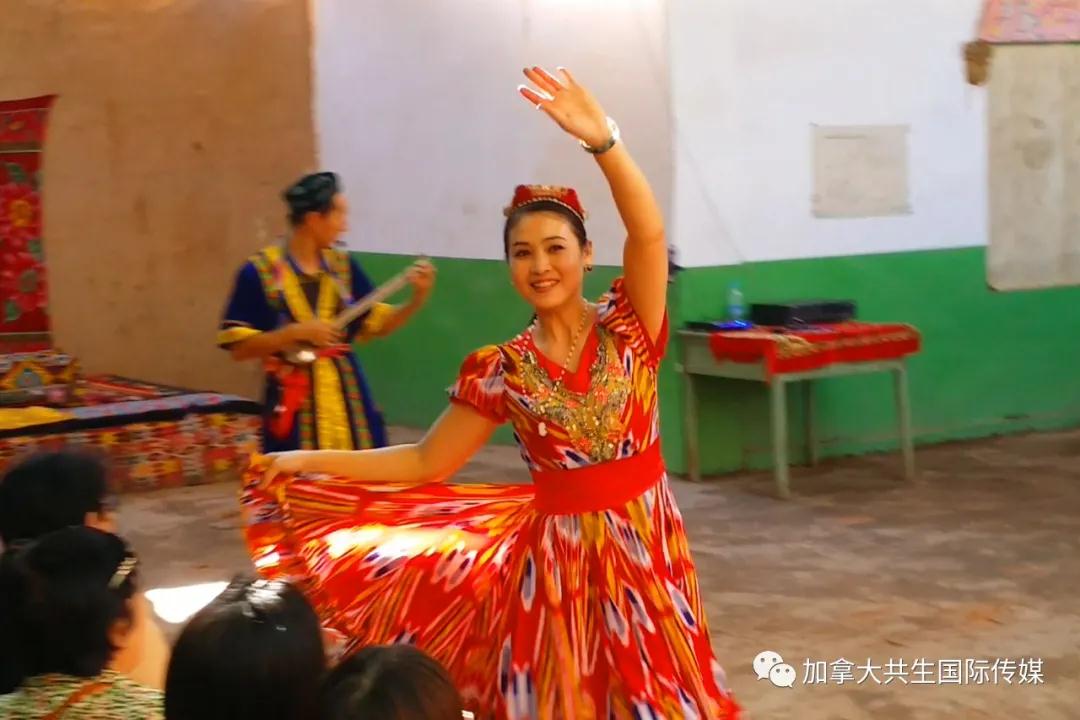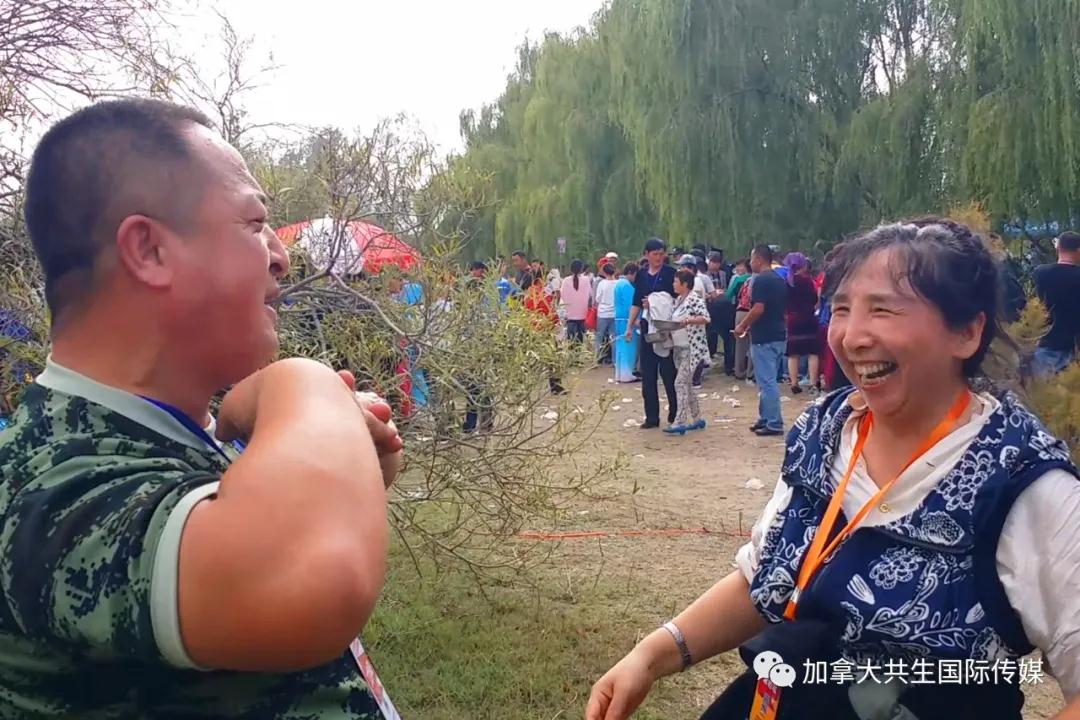Uyghur in My Eyes
Uyghur in My Eyes
Symbiosis International Media of Canada
Hu Xian
On February 22, I was surprised that the House of Commons of Canada passed a motion stating that China was committing "genocide" against the Uyghur people in Xinjiang.
I come from Beijing and Xibe nationality; I have been to Xinjiang; I have Uyghur and Muslim friends; therefore, I feel I have more say on Xinjiang issues than many people who voted in the House of Commons. Here I would like to talk about my perception of the Uyghurs in Xinjiang and how I feel about this matter.
The Uyghurs are a favorite of the country
This is my first and deepest impression of the Uyghurs. In 1962, when I was in the second grade of primary school, there was a transfer student in my class named Maynur, with big eyes, slightly tan skin, and was not very tall. The teacher asked her to sit in the second row by the window, a bright and good seat to see the blackboard. Her father worked at the Ethnic Publishing House, which was separated by a wall from the dormitory of the Ministry of Communications where I lived. Perhaps because of her unique appearance, or the “Uncle Kurban”, she attracted the attention of all boys and girls from the first day. She had some difficulties in her study, so the teacher specially arranged a student to help her. Later, I became good friends with her and Wu Jinzhen, going to and leaving school together, and visiting each other's homes. Her family also lived in the apartment. But in her home, there were carpets, tapestries on the walls, fruit trays on the tables, and beautiful furniture and decoration. Her mother, who seemed to be neither speaking Chinese nor going to work, always greeted us warmly. My father, a Xibe nationality, and the Koreans living downstairs are both ethnic minorities and state officials like her father. Our furniture was allocated by the government like the Han officials. The tables, chairs, beds and wardrobes were almost the same, but her home was very unique. Since then, I have been envious and feel that the Uyghurs were a favorite of the country.
The Uighurs enjoy preferential policies
Since the 1990s, when I returned to visit my relatives, I was always reminded not to bargain with vendors from Xinjiang and not to touch their goods. Once I touch or ask for the price of their goods, I must buy them. What's more, I was warned against argue with them, because they carried knives legally. Once disagreement occurs, they dare to stab me if they charge me of discrimination. The government would be lenient with and release them after disciplining, as long as nobody dies. Since the national policies favored them, we have no choice but to tolerate them acting aggressively without fear.
I know that there are also ethnic minorities in Canada who are allowed to go to school with their heads wrapped, and thus without a military cap, or with a knife. However, they will be punished indiscriminately if they violate the law. In Quebec, commercial signboards are allowed to use their own national characters, such as Chinese restaurants in Chinatown. However, French must be given priority, and the Chinese character font size must not be greater than French character. Otherwise, a fine will be imposed or a lawsuit will be brought. Since then, I have felt that China has been too indulgent and lenient with the Uyghurs.
But in fact, what people say is not the case, at least I have never met such cases. My family lived in Hepingli, near the Ethnic Publishing House, and there were a lot of people from Xinjiang with stalls. At first, I was very careful. Later, I tried to buy rice cakes and bracelets from them only to find that they were very friendly. In my opinion, the preferential policies are true. For example, they are allowed to go out with knives, and I believe that, as a saying goes, “there are no waves without wind”, the phenomenon of “leniency” due to minority policy does exist, otherwise the hearsay would not spread so widely.
Uyghur is influenced by terrorists in other countries
In December 2007, I went to Afghanistan for an interview. At that time, there were only two airlines flying to Kabul, Afghanistan, one from Dubai and the other from Urumqi. I chose the latter. On the flight from Beijing to Urumqi, I was seated next to a young man about 30 years old. We talked all the way. I learned that his ancestral home was Shandong, and his parents were both young intellectuals who went to Xinjiang to support the border areas. He was born and raised in Urumqi, which he felt was his hometown. When mentioning his hometown, his eyes darted sadly: “The students in my primary and secondary schools were mostly Uyghur people, while the Han, Kazak, Xibe and Tajik students were few. But everyone was as close as brothers. We sang together, played football together, fought together, and chased after girls together. We didn't have to knock on the door when going to anyone's house, but just push the door to get in. Yet all of a sudden everything seems to have changed. We lost contact, and pretended not to know each other if met in the street. Sometimes I could even see hostility in their eyes.”
''One day, I encountered an old classmate, who used to get along well with me, face to face. She was covered with black gauze from head to toe. If it weren't for her eyes, stunned look and hasty dodge when she saw me, I would definitely not recognize her'' …
I told him the purpose of my trip, and he no longer concealed his identity as a soldier from me. He said he had just received an order from the army that three groups of terrorists had entered the country. One of their purposes was to organize people to leave the country for training in terrorist bases, and the other was to set up armed training bases locally. A large number of Uyghur young adults were brainwashed to answer the call. He had been visiting relatives in Shandong, but was called back in advance. When we got off the plane, we separated and went different ways. Knowing that we would never meet again, we said goodbye to each other without leaving names. From then on, I have known how serious the anti-terrorism situation is.
Uighurs themselves suffer greatly
In August 2014, the 250th anniversary of the Westward Migration Festival was held in Qapqal Xibe Autonomous County, Ili Kazak Autonomous Prefecture, Xinjiang. My second elder brother, third elder brother, elder sister, and I attended the event upon invitation. At that time, the haze of the ''4.30'' terrorist attack (the ''East Turkistan'' terrorist attack in Urumqi Railway Station, which killed 3 and injured 79) had not yet cleared, so when we transferred trains at this station, every corner of the waiting hall was filled with terror all the time.

A Uyghur woman from Yining City
Photo by Hu Hai
A Uyghur woman from Yining City told me that she came here with her 2-year-old daughter but couldn't find an accommodation, because she didn't know that during that time all the Uyghurs travelling in Xinjiang Uygur Autonomous Region must get a letter of proof from the police station in advance.

We become friends for 40 minutes
Photo by Hu Hai
She was exhausted. I got her a seat and we became friends for 40 minutes. She hated the terrorists for separating her from her husband, who was sent to southern Xinjiang to counter the terrorism for three months, and she had to cancel her one-week travel plan and return home tonight. (I put her story into my Xinjiang Travel Notes)
After the West Moving Festival, we travelled in Xinjiang by ourselves. The famous Turpan Basin was a big disappointment to us. ''People outside Xinjiang who used to help us pick grapes and purchase grapes from us are all too afraid to come now. The grapes are all rotten. Tourists don't come, either. The whole street was once known for agritainment business. And the business in this season used be very brisk, but now there is only my family left...... '' Emily, a Uyghur girl told us.

The beautiful Emily
Photo by Hu Hai
The beautiful Emily danced beautifully for us in her beautiful Uyghur-style dress. When introducing Uyghur customs, she talked about the consequences of ''violent terrorism''. ''I love bright-colored clothes and hats, and we Uyghurs always love to look pretty. Those people in black clothes and hats were brainwashed by foreign religious extremists. They damaged the image of our Uyghurs, destroyed the economy of Xinjiang and dragged the whole Uyghurs down with them. Now we are not welcomed outside Xinjiang, and Xinjiang has become a place of insecurity. The Grape Valley suffered a huge loss.'' she said with anger and grief. Since then, I have become more aware that the terrorists are not only taking lives, destroying stability, but also undermining China's ethnic unity. It's not just the Grape Valley, Xinjiang and the Uyghur people that suffer huge losses.
The warm and kind Uyghur people
I will never forget the multi-ethnic activity on the bank of Ili River, namely ''Find the Baturu (which means hero in Xibe language)'' on the afternoon of August 19, 2014, not to mention the joy when a handsome Uyghur man taught me how to dance the Uyghur dance!

While learning the Uyghur dance, I laugh out loud
Photo by Hu Hai
Travelling in Xinjiang, we met a lot of warm and kind Uyghurs. Anyone who is educated, capable of speaking Chinese and standing on their own feet, including sheepherders, drivers, tour guides, traders, or owners, can live the life they want with sunny smiles. These people have been exactly the Uyghurs I have pictured in my mind since I was a kid.
Compulsory education and professional skill training are necessary
To experience the real local life, we stayed in the villagers' house during our trip in Qapqal. I noticed that almost every Xibe family had a brick house with yards. They also had fertile land and strong cattle. However, the Uyghurs' village looked broken and neglected. A Xibe told us that the Xibes and the Uyghurs used to be the same. All their children studied in one school. "Then they became lazy and distanced from us. Their children didn't go to school any more. A Uyghur classmate of mine used to come to help me during the farming season, but after he earned some money, he went missing again," He said. I asked him what they do every day. The answer was, Chanting and sometimes fighting".
I don't believe rumors that go against common sense
I have never been to a so-called "concentration camp" or "re-education camp" hyped up by the Western media and politicians. But depending on my decades of knowledge of China and the Uyghurs and my common sense, I believe that many of their accusations are untenable. It is even more of a nonsense to talk about "genocide". According to recent official figures, in the past 60 years and more, the average life expectancy in Xinjiang has increased from 30 to 72. From 2010 to 2018, the Uygur population rose from 10.17 million to 12.72 million, an increase of 2.55 million or 25%, higher than the 14% increase of overall Xinjiang population, and significantly higher than the 2% increase of the Han population. Anyone who has lived in China knows how favorable the government's policies are to ethnic minorities. Ethnic minority groups are granted extra scores in college entrance examinations, non-staple food subsidies, preferential policies for the country's selection of officials, and a lot more. In fact, I am a beneficiary myself. The preferential treatment for Uyghur not only greatly exceeds that of the Han nationality, but also exceeds that of other ethnic minorities.
Just now, I specifically asked a Xibe brother in Qapqal, Xibe Autonomous County about the Uyghurs' living conditions there, and he proudly said, "Superb! The safest place in our country is our hometown Xinjiang!" He continued saying that, "All the Uyghurs in the village have been lifted out of poverty. The ethnic relations here have always been good, and now they are even better than when you were here..." Speaking of the concentrated learning, he said, "that is to teach people to read and learn skills, so that people can find a good job". When asked about the population and family planning policy, he said the Uyghurs have always been allowed to have three children, and that policy has never changed.
I also went to ask my Uyghur friends, and they generally agreed that the happiness index among the Uyghurs is very high now, because they are safe, live a stable and tranquil life, and are full of hope. A friend sent me an article titled "What will Urumqi look like in three years? Beyond your imagination! You will be grateful to stay in Urumqi"; Another friend told me on WeChat that " Department of Transportation will invest 60 billion yuan of fixed assets in transportation infrastructure this year, and the total railway operation in Xinjiang will exceed 6,000 kilometers ..." I can feel his excitement even through his words; Still another friend who is a few years younger than me had two daughters born when Han people were only allowed to have one child, and now he has several grandchildren, living a happy and satisfactory life. He also said that there is no need to worry about terrorist attacks on the road any more. They are now full of confidence in the future because of social stability, economic development and comfortable life. He also sent me a few photos of his three beautiful granddaughters who are as lovely and beautiful as angels, and one of them has been chosen as an image ambassador, which makes him very proud.

When we visited Emily's home in 2014, she explained to us "Why the Uyghurs have so many children in one family?"
"We are farmers and we get land according to the number of family members, so it's common to have seven or eight children in one family. Later, we also carried out family planning, so we could only have at most three children..." Emily responded to a visitor's question.
"Three!" How many Chinese Han people dream of this! With this evidence, the vast majority of Chinese people will never agree with the accusation that China is committing "genocide" against the Uyghurs.
Where did the rumors come from?
On February 18, Gray Zone, an independent news website of the United States, pointed out in an investigation report that the US government and some western mainstream media accused China of constituting the so-called "genocide" in Xinjiang only on the basis of a research report by a right-wing religious extremist (Adrian Zenz), and after careful evaluation, this report written by Zenz was charged of malicious data abuse, false statements, selective use of materials and distortion of facts.

Citing a decline in the growth rate of ethnic minorities in some parts of Xinjiang in recent years, Zenz called "population control measures" "genocide" in his report according to the investigation report by Gray Zone. However, Zenz cited data in his report that contradicted his conclusions, showing a significant increase in the Uyghur population in Xinjiang between 2010 and 2018, and a significantly higher rate of population growth in Xinjiang between 2005 and 2015 than that of the Han nationality group.
In addition, Zenz stigmatized the promotion of public medical services in Xinjiang as an example of "genocide" in his report, and fabricated relevant data of family planning operations in Xinjiang in order to support his views. The report also said that some western mainstream media called Zenz an "expert on China", but deliberately avoided his political and religious background.
Zenz is a far-right religious figure who currently works for a far-right foundation established by the US government.
It turned out that the Uyghurs in Xinjiang were "genocide" in such a way ...
(Edited by Gong Sheng)